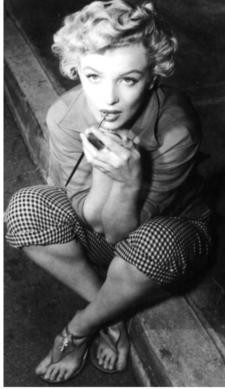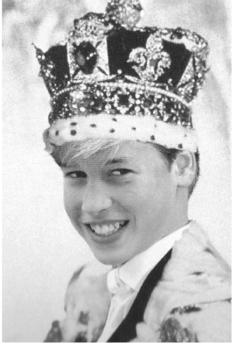Jacko, His Rise and Fall: The Social and Sexual History of Michael Jackson (59 page)
Read Jacko, His Rise and Fall: The Social and Sexual History of Michael Jackson Online
Authors: Darwin Porter

When Bob Jones heard that Michael was creating some imaginary affair
with Princess Di, he said, "Give me a break! The King (i.e., Michael) didn't
have a relationship with Princess Diana. He admired her, and a number of
calls were put into Diana's people on behalf of Michael. He badly wanted to
be friends with her, but apparently she wasn't the least bit interested."
Bob claimed that he personally made calls to Kensington Palace. Instead
of getting Diana on the phone, "a polite gentleman" answered. "I told him that
Michael had matters he wished to discuss with the Princess," Bob said. "I was
told to write down the subject matter in detail, send it along, and they'd get
back to me. To my knowledge, none of those calls was ever returned."
Finally, through this "polite gentleman," Michael was told in rather harsh
terms that no more presents for William would be accepted but would be
returned unwrapped to Neverland. Michael was also told that because of prior
commitments, William would not be available to be Michael's guest at
Neverland-"not at the present time, not in the near or even distant future."
At the bottom of the carefully written note, the Princess had scrawled in her
own handwriting:
"Michael,
Please stop sending gifts! They aren't wanted. And please stop calling.
Your calls will not be returned. Best wishes in your future career."
It was reported that Michael, after receiving this note, stayed in his bedroom at Neverland, crying for three days and refusing to eat except for a cup
of vegetable broth a day.
Princess Di wasn't the only dilemma facing Bob Jones as Michael's publicist. Within a few months after signing on, Bob came to believe that his new
employer was a racist.
In his book, The Man Behind the Mask, Bob writes: "Michael Jacksonbeneath the bleached skin that has made him a grotesque caricature of a
female alien-was black too. He was also the weirdest and most inexplicable
of racists. His favorite word to describe blacks, his original race, was Splaboo.
Yep, Splaboo. It was a word he used a lot, a word he used around people such
as Macaulay Culkin."
Bob also noted in his memoirs that Papa Joe always "favored lightskinned black folks" and that "Tito, Jackie, Janet, and many of the younger
generations have selected white or non-blacks as their mates."
Michael was never known as a public champion of black people, as was
his close friend, Marlon Brando, or many other stars such as Harry Belafonte.
As Bob and the rest of the world were observing in the late 1980s, Michael's
skin color became a source of endless tabloid speculation. He was in denial of
his own pigmentation, which was changing before the eyes of his fans.
In his role as a spokesman for Michael, Bob was constantly asked what Michael was doing to change his original skin color. Through it all, Michael
continued to deny skin bleaching and plastic surgery on his nose. "I guess he
didn't want to look like a Splaboo," a security guard at Neverland said sarcastically.
To make himself even whiter, Michael smeared his already-bleached skin
with white makeup, creating a freakish aura. Bob noted that Michael, between
1972 and 1998, had so much plastic surgery that "he went from being a really handsome African-American kid to an awful facsimile of a Caucasian
woman.
Skin pigmentation wasn't all that was on Michael's mind during the late
80s as he installed himself at Neverland.
The tabloids followed his every move, reporting on one scandal after
another whether true or not. One astonishing report may have had some
authenticity to it. Michael was terrified of being recognized by his fans when
he ventured out of his house. To prevent that, he adopted many disguises.
One day he heard that some Swiss scientists were close to developing a potion
that would make people invisible-movies, of course, have been made with
that theme. Michael seemed willing to invest $1 million in that potion if it
could make him invisible. He told some of his staff at Neverland that, if invisible, he could give some of the potion to Bubbles too. That way, both of them
could go shopping at various malls, including toy stores, and not be molested
by the public. How an invisible man could go into a toy store and buy merchandise without attracting attention was never explained.
After several futile attempts, Michael realized that the invisible potion, if
such an elixir existed, was only in the early planning stages, far too soon in its
development to make him disappear any time soon.
Far more obtainable-or so he reportedly felt at the time-was a desire to
acquire another skeleton. He'd failed to secure the bones of the Elephant Man.
But out there in a Los Angeles cemetery, with the traffic whizzing by, rested
the bones of the world's most enduring sex symbol, Marilyn Monroe.
He'd heard that the heirs to her estate were "one greedy bunch," as his
friend Marlon Brando had charged. Brando later reported that Michael had
talked seriously of making an offer of $5 million to secure MM's skeleton. "I
just went along with Michael for the ride," Brando claimed. "I thought, of
course, it was just a .joke. My mistake was in not realizing that Michael's doesn't joke. I like to play practical jokes on people all the time, especially if they
are close friends."
As a great actor, Brando maintained a serious face when he told Michael
what he might do with Marilyn's bones. "Marilyn and I were lovers," Brando
said. "Our affair began right after the war when I picked her up at a sleazy bar
in New York. It continued on and off right up until her murder. In fact, hours before she was killed, we had a date to get together for dinner."

Marilyn's
fate?
Brando's suggestion, if Michael could have her
corpse removed from the Mausoleum of Memories at
Westwood Memorial Park, was not to keep Marilyn's
bones hidden away at Neverland. "First, I'd have a designer put Marilyn's bones in a bikini," Brando said. "She
loved diamonds-even sang about them. Definitely a diamond tiara and a diamond necklace are in order. The costlier the better. I'd install her as an attraction on Hollywood
Boulevard, charging fifteen dollars a ticket. People would
gladly pay that. But it can't be just a stack of bones. I'd lay
her out in the center like a funeral parlor. An open casket.
But all around I'd have wide screens showing some of her
famous moments. That walk in Niagara. That satiny pink
gown she wore when she sang `Diamonds are a Girl's Best
Friend' in Gentlemen Prefer Blondes. Her walk at the rail
station in Chicago in Some Like It Hot. Her singing `Heat
Wave' in There's No Business Like Show Business.
Newsreels of Marilyn and Joe DiMaggio. Her standing on
that subway grate in The Seven Year Itch as a blast of hot
air blows her skirt up to her panties. Definitely pictures of her in New York,
in that skin-tight gown singing `Happy Birthday' to President Kennedy."
Michael told Brando that he thought "all your ideas are just great."
After Michael had left his house, Brando called one of his friends. "The
kid actually thought I was serious. I was just talking shit like I like to do for fun. He really believed
me. I must be a better actor than I thought I was."

Goddess
Like Prince William, the bones of Marilyn
Monroe eluded Michael. But he still wanted to
live in a fantasy world, one he could create at
Neverland. After recovering from several setbacks, he pulled himself up out of his bed to oversee construction, on the grounds of Neverland, of
"another Disneyland," one far greater than he'd
created at Hayvenhurst. "I don't have to dream,
but can live in my dream," he told staff members.
At Neverland, Michael experienced the first
real freedom he'd ever known in his life. At long
last he was free of his smothering mother,
Katherine, and dictatorial Papa Joe. He also did n't have his siblings, especially their mates, interfering or, worse, judging his
lifestyle.
Michael's freedom didn't extend to his employees, each of whom was
forced to sign a confidentiality agreement. "He ran Neverland like Himmler
might direct a concentration camp," said one disgruntled employee who had
been fired because he'd violated a cardinal rule. "I talked to one of the other
employees. We were not supposed to talk to each other. We were also told to
look down at our navels when Michael walked by." As an afterthought, he
added, "It was Jackson who should have bowed his head in shame."
In the years ahead, employees-most of whom were no longer working at
Neverland-reported that dozens of young boys were dropped off at the
guarded front gate and handed over to Michael's "security force." One of
Michael's special policemen would then assist the boy into a fanciful carriage
pulled by a Clydesdale.
After he had been escorted to the main hall of Neverland, the boy du jour
was taken to Michael's bedroom. After securing clearance, the boy was
allowed to enter the room. At such times, Michael himself would be lurking
behind the door but would not appear within its frame. The aide would not see
him in the flesh. Presumably the boy wouldn't get to feast his eyes on Michael
until after he entered the darkened room.
When staff members did see Michael in his room, as when making a
delivery, he was often in tight white briefs, but always in full makeup.
Sometimes he'd be discovered in bed with a young boy, each nude from the
waist up, a sheet covering their lower bodies.
Later, one employee told the police, "I don't know how Michael contacted the parents of these young boys and gained
their consent to deliver a ten-year-old, or even a
twelve-year-old, to Michael's den. How did he
make contact with them and get their permission?
I know he did that because it was the parents,
sometimes just a mother, who would deliver her
son to Neverland. Sometimes a boy would stay
only a night, with his mother waiting to pick him
up the next morning. In one case an especially
beautiful wide-eyed boy, probably the best-looking kid I've ever seen in my life, was delivered to
Michael's room where he stayed nearly a month.
Michael must have really dug that kid."

There are just some things
MJ can't have
Two courses of introductions have been suggested. Michael often invited young boys,
including some young girls, to Neverland to enjoy its Disney-like attractions. Once the children were at play, he would
select those boys whom he'd like to get to know better. Often he made his
selection when they were playing shirtless or else wearing a swim suit to jump
into his pool.
Another method of contact was through dozens of model agencies in Los
Angeles, many of whom specialized in child models for both TV and print
advertising. Michael would order publicity photographs of these boys sent to
Neverland. Staff members reported that he would spend the good part of many
a day studying each photograph carefully and evaluating it. His excuse to the
agencies was that he was planning to make musical videos involving child
actors, as he'd done in the past. It was reported that Michael seemed especially interested in the lips on a young boy.
